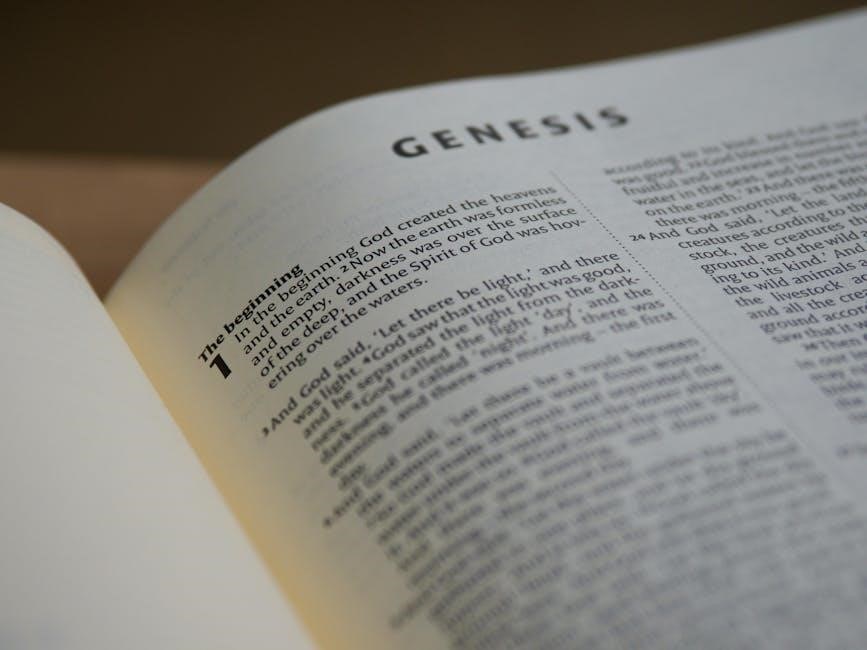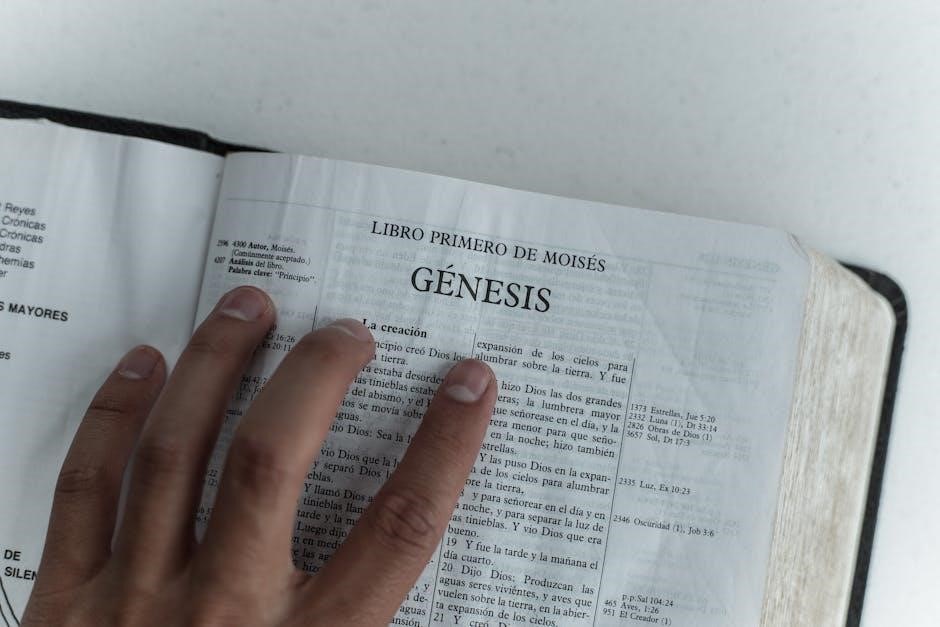The Bible, spanning from Genesis to Revelation, contains a comprehensive list of stories that outline creation, redemption, and God’s divine plan. This collection of 66 books presents key events, from the world’s beginning to humanity’s ultimate destiny.
Overview of the Bible’s Structure

The Bible is divided into two main sections: the Old Testament and the New Testament. The Old Testament contains 39 books, beginning with Genesis and ending with Malachi, while the New Testament includes 27 books, starting with Matthew and concluding with Revelation. These books are further categorized into different genres, such as law, history, poetry, prophecy, Gospels, Epistles, and apocalyptic literature. The Old Testament focuses on God’s relationship with the Israelites, including creation, the patriarchs, and the prophetic messages. The New Testament centers on the life, teachings, death, and resurrection of Jesus Christ, as well as the establishment and growth of the early Christian church. The final book, Revelation, provides a visionary perspective of the end times and God’s ultimate triumph. This structured format allows readers to trace the narrative of salvation history, from creation to redemption, and understand God’s plan for humanity. The Bible’s organization reflects its historical, theological, and literary diversity, making it a rich and complex text for study and reflection.

Importance of Studying Bible Stories
Studying Bible stories is essential for understanding the foundational themes of faith, morality, and history. These narratives provide insights into God’s relationship with humanity, offering lessons on obedience, forgiveness, and redemption. They serve as a moral and ethical guide, shaping personal values and decision-making. Bible stories also reveal the historical and cultural context of ancient civilizations, enriching one’s understanding of the past. Additionally, they inspire spiritual growth by highlighting the lives of key figures like Abraham, Moses, and Jesus, whose experiences and teachings continue to influence modern beliefs. Reading these stories fosters a deeper connection to one’s faith and community, while their timeless messages remain relevant in addressing contemporary challenges. Moreover, exploring Bible stories encourages reflection on life’s purpose and meaning, helping individuals navigate their own journeys of faith and personal development. Ultimately, these accounts are a cornerstone of religious education, offering wisdom and hope across generations.

Old Testament Stories
The Old Testament recounts the creation of the world, the early history of humanity, and the journey of God’s chosen people, Israel. It explores themes of faith, redemption, and divine promise, setting the stage for the New Testament’s message.

Creation and Early Humanity (Genesis 1-11)

Genesis 1-11 lays the foundation of the Bible, recounting the creation of the world and the early history of humanity. It begins with God’s majestic creation of the universe in six days, culminating in the formation of Adam and Eve, the first humans, in His image (Genesis 1-2). The narrative then explores the fall of humanity into sin through Adam and Eve’s disobedience, leading to expulsion from the Garden of Eden (Genesis 3).
The subsequent chapters detail the early descendants of Adam, including Cain and Abel, and the spread of sin and violence across the earth. Genesis 6-9 recounts the story of Noah, a righteous man who, along with his family and two of every kind of animal, survived a global flood sent by God to judge humanity’s wickedness. After the flood, humanity’s wickedness persisted, leading to the Tower of Babel, where God confused the languages, scattering people across the earth (Genesis 11).
These stories establish key themes of creation, sin, judgment, and redemption, setting the stage for God’s plan to restore humanity through His chosen people. They provide a universal account of human origins and the early stages of God’s relationship with His creation.
The Patriarchs: Abraham, Isaac, and Jacob (Genesis 12-36)
Genesis 12-36 focuses on the lives of Abraham, Isaac, and Jacob, known as the Patriarchs, whose faith and obedience laid the foundation for God’s covenant with Israel. Abraham, called by God in Genesis 12, is celebrated for his unwavering faith, even when tested by the command to sacrifice his son Isaac (Genesis 22). His story highlights God’s promise to make him the father of a great nation, emphasizing trust and divine fulfillment.
Isaac, though less prominent, plays a crucial role as the link between Abraham and Jacob. His story in Genesis 26 underscores themes of faith, provision, and the continuation of God’s promises. Jacob, however, stands out for his dynamic and transformative journey. From his deceit of Isaac to his wrestling with God (Genesis 32), Jacob’s life illustrates personal growth, repentance, and the renaming to Israel, symbolizing a new identity and purpose.
These narratives showcase God’s faithfulness and the Patriarchs’ role in shaping Israel’s identity, setting the stage for the nation’s future and the ultimate fulfillment of God’s redemptive plan. Their stories remain central to understanding the biblical narrative.
Moses and the Exodus (Exodus 1-18)
Moses and the Exodus narrate the dramatic deliverance of the Israelites from Egyptian slavery, a pivotal event in biblical history. Exodus 1-18 details their suffering under Pharaoh, the rise of Moses as God’s chosen leader, and the miraculous escape from Egypt. The story begins with the Israelites’ oppression and Moses’ divine calling through the burning bush (Exodus 3), leading to his confrontation with Pharaoh. The ten plagues, culminating in the Passover, demonstrate God’s power and mercy, as the Israelites are spared while Egypt suffers judgment.

The Exodus reaches its climax with the parting of the Red Sea, allowing the Israelites to escape Pharaoh’s pursuing army (Exodus 14). This act of divine deliverance solidifies Israel’s identity as God’s chosen people. Upon reaching Mount Sinai, Moses receives the Ten Commandments, establishing the covenant between God and Israel. These events shape the theological and cultural foundation of the Old Testament, emphasizing themes of redemption, obedience, and covenant relationship.
The Exodus story remains central to understanding Israel’s history and faith, serving as a powerful metaphor for liberation and divine faithfulness. It also sets the stage for the wilderness journey and the eventual conquest of Canaan, further highlighting God’s faithfulness and the people’s journey toward obedience.

New Testament Stories
The New Testament shares the life of Jesus Christ, the Acts of the Apostles, and letters to early churches. It concludes with Revelation, offering teachings on faith, redemption, and humanity’s ultimate destiny through God’s plan.

The Life of Jesus Christ (Matthew, Mark, Luke, John)
The life of Jesus Christ, as narrated in the Gospels of Matthew, Mark, Luke, and John, forms the cornerstone of the New Testament. These accounts begin with His miraculous birth to the Virgin Mary, emphasizing His divine origin. Jesus’ baptism by John the Baptist and His temptation in the wilderness mark the commencement of His public ministry. Through parables, miracles, and teachings, Jesus revealed God’s love and forgiveness, challenging societal norms and religious practices. His compassion is evident in miracles like turning water into wine, healing the blind, and feeding the multitude. The Passion Week, culminating in His crucifixion and resurrection, underscores the central message of redemption. The Gospels conclude with Jesus’ ascension and the Great Commission, urging believers to spread His teachings globally. These stories collectively portray Jesus as the Messiah, Savior, and Son of God, offering humanity a path to eternal life and reconciliation with the Father, aligning with the broader narrative from Genesis to Revelation.

The Acts of the Apostles and the Early Church (Acts 1-28)
The Acts of the Apostles chronicles the early Christian church’s birth and growth following Jesus’ resurrection and ascension. It begins with the apostles awaiting the Holy Spirit in Jerusalem, where they experienced Pentecost, empowering them to preach boldly. This pivotal event marked the church’s establishment, united in faith, fellowship, and service. The apostles performed miracles, such as Peter healing the lame man, and faced persecution, including Stephen’s martyrdom, which scattered believers, spreading the Gospel beyond Jerusalem. The conversion of Saul, later Paul, a fierce persecutor turned missionary, highlights God’s transformative power. Peter’s vision to include Gentiles, like Cornelius, and Paul’s missionary journeys showcase the church’s expansion. Acts details the challenges of unity amidst diversity, the role of church leaders, and the resilience of believers. It concludes with Paul in Rome, preaching the Gospel freely, symbolizing the church’s universal mission. Acts bridges the life of Christ and the Epistles, illustrating the Holy Spirit’s work in building a global community of faith, central to the narrative from Genesis to Revelation.
The Epistles and Revelation (Romans to Revelation)
The Epistles and Revelation conclude the Bible, offering teachings, guidance, and prophetic visions. The Epistles, written by apostles like Paul, Peter, James, John, and Jude, address early Christian communities, providing wisdom on faith, morality, and church life. They emphasize love, grace, and the unity of believers. Key letters include Romans, exploring salvation and God’s righteousness, and Corinthians, focusing on spiritual gifts and the resurrection. The Epistles also include practical advice for living a godly life. Revelation, the final book, contains prophetic visions of the end times, including the return of Christ, the final judgment, and the establishment of a new heaven and earth. It concludes with a vision of the New Jerusalem, symbolizing God’s ultimate triumph and eternal fellowship with humanity. Together, the Epistles and Revelation provide a theological foundation and a hopeful vision of God’s ultimate plan, bridging the gap between the early church and the future fulfillment of God’s promises. These writings are central to understanding Christian doctrine and eschatology, offering both instruction and assurance to believers.



About the author